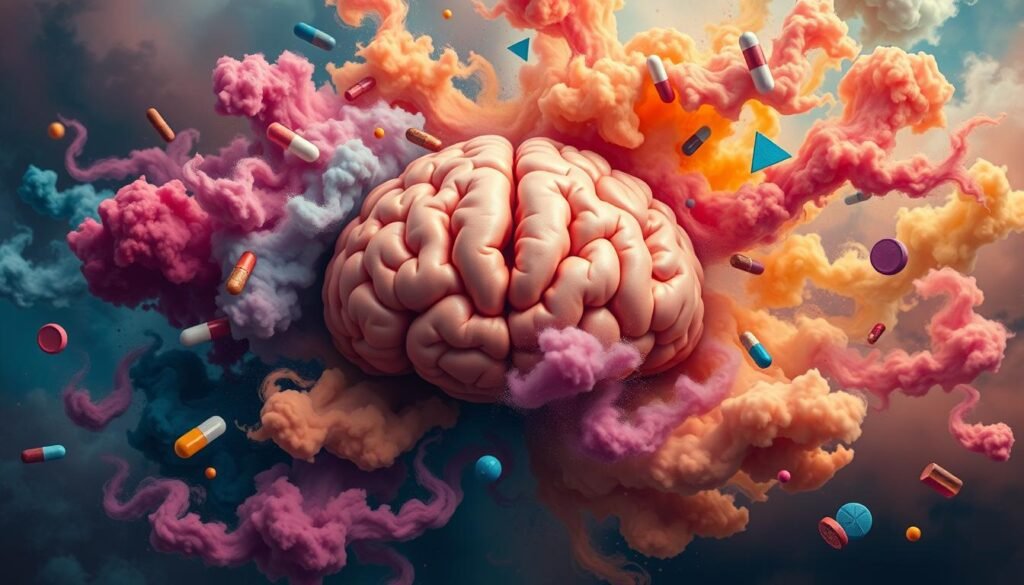More than half of the people with ADHD also deal with anxiety. This shows how closely ADHD and anxiety are linked, making their treatment difficult. Adderall, known for treating ADHD and narcolepsy, is now being talked about for anxiety. But using it for anxiety comes with much debate about its safety and effectiveness. It’s important to learn how Adderall works and what it means for people with both ADHD and anxiety.
Key Takeaways
- Over 50% of those with ADHD also experience anxiety disorders.
- Adderall is primarily prescribed for ADHD, not for anxiety treatment.
- Short-term use may show benefits, but long-term effects on anxiety are unclear.
- Common side effects of Adderall can worsen anxiety symptoms.
- Seeking professional help is essential for proper medication management.
Understanding Adderall and Its Purpose
Adderall is a central nervous system stimulant that combines amphetamine and dextroamphetamine. It mainly treats attention deficit hyperactivity disorder (ADHD) and narcolepsy. The drug boosts neurotransmitters like dopamine and norepinephrine, improving focus and curbing impulsive behaviors.
It’s key to know that Adderall doesn’t cure ADHD. It should be taken as prescribed due to its potent nature. Knowing the benefits and limits of this stimulant is essential for both users and healthcare professionals.
Monitoring and possibly adjusting the treatment is often necessary. Some people might face side effects such as anxiety. Symptoms of anxiety include feeling nervous, breathing quickly, and a faster heartbeat. Those with existing anxiety issues might find these symptoms worsen, calling for a customized approach to care.
Getting advice from healthcare experts is crucial for getting the most out of Adderall. This makes it an important asset in managing ADHD effectively when used right.
| Aspect | Description |
|---|---|
| Components | Amphetamine and dextroamphetamine |
| Primary Use | Treating ADHD and narcolepsy |
| Mechanism | Increases neurotransmitter release |
| Common Side Effects | Anxiety, nervousness, increased heart rate |
| Considerations | Requires careful monitoring and dosage adjustments |
What is Anxiety and Its Impact?
Anxiety is a common mental health issue. It causes a lot of worry that disrupts daily life. It includes different forms, like generalized anxiety disorder and panic disorder. People with anxiety may feel restless, have trouble focusing, and experience physical signs like a fast heartbeat or tense muscles. These signs can really affect their relationships, work, and happiness.
About half of the adults with ADHD also have an anxiety disorder. This mix makes daily life even more challenging. Anxiety can make ADHD symptoms worse, causing more restlessness and focus issues. Many ADHD sufferers worry about their productivity and ability to handle tasks.
Treating anxiety disorders is key to better mental health and lessening symptoms. There are many treatment options, from medication to therapy. Recognizing the big impact of anxiety disorders is crucial. It helps those affected find ways to improve their lives.
| Anxiety Disorder Type | Common Symptoms | Potential Impact |
|---|---|---|
| Generalized Anxiety Disorder | Excessive worry about everyday matters, restlessness, trouble concentrating | Impairment in work, relationships, and daily activities |
| Panic Disorder | Sudden panic attacks, heart palpitations, chest pain, fear of dying | Avoidance of situations, reduced quality of life |
Can Adderall Help with Anxiety?
The link between Adderall and anxiety isn’t straightforward. People react differently to this stimulant. It’s important to grasp how Adderall works to see if it might help with anxiety. While it can ease anxiety for some, it might make things worse for others.
Adderall’s Mechanism of Action
Adderall increases brain neurotransmitters, notably dopamine and norepinephrine. This boost can enhance focus and brain function. For those with ADHD, it might lessen anxiety. Yet, research shows that many adults with ADHD also struggle with anxiety before taking Adderall. Although Adderall might initially improve mood, its effect on anxiety varies widely.
How Adderall May Affect Anxiety Symptoms
For some, Adderall lessens anxiety by better managing ADHD. The idea of stimulants for anxiety might not seem obvious, but they can offer brief relief. Conversely, the increase in heart rate and nervousness from Adderall can intensify anxiety for many. The risk of becoming dependent on Adderall can also cause anxiety to fluctuate, particularly between doses. Withdrawal might worsen mental health.
Given these differing impacts, a holistic treatment plan is crucial. This plan should tackle both ADHD and anxiety. Knowing the patient’s history helps healthcare providers decide if Adderall is a good fit for their adderall anxiety treatment plan.
| Factor | Impact on Anxiety |
|---|---|
| Adderall’s Dopamine Release | Can temporarily improve mood, reducing anxiety |
| Increased Heart Rate | May exacerbate feelings of anxiety |
| Potential for Dependency | Can lead to withdrawal symptoms that heighten anxiety |
| Co-occurring Conditions | Over 50% of individuals with ADHD experience anxiety |
ADHD and Anxiety: A Common Co-occurrence
People with Attention Deficit Hyperactivity Disorder (ADHD) often have anxiety disorders too. Almost half of adults with ADHD struggle with anxiety, making treatment complex. It’s key to understand the link between ADHD and anxiety disorders for effective help.
Link Between ADHD and Anxiety Disorders
The connection between ADHD and anxiety is complex. About 25% of people with generalized anxiety disorder (GAD) also have ADHD. Both can share symptoms like trouble focusing, not being able to sleep, and feeling restless. Genes and environment both play a part in this. Also, 12% to 37% of adults with ADHD might get post-traumatic stress disorder (PTSD) in their lifetime.
Complexity of Treating Both Conditions
Treating ADHD and anxiety together needs careful planning. Stimulants like Adderall for ADHD can make anxiety worse. So, doctors might use other meds like atomoxetine or methylphenidate. These can help with both ADHD and anxiety. Adding exercise, good food, and a set routine is important too.

Potential Side Effects of Adderall on Anxiety
Adderall is a stimulant often used for ADHD. It can have side effects that raise anxiety levels. Knowing these effects is vital for anyone thinking about using it for anxiety or similar conditions.
Common Side Effects That May Worsen Anxiety
Some people on Adderall may feel more anxious. They could have a faster heart rate, feel restless, and have trouble sleeping. These signs can make existing anxiety worse, making things hard to handle.
Taking too much Adderall can increase these problems. It can make people with ADHD more sensitive to them. Knowing about these side effects can help manage anxiety with Adderall use.
Physical Dependence and Withdrawal Symptoms
Using Adderall for a long time can lead to dependence. This means you might need the drug to feel normal. Stopping it suddenly can cause withdrawal. This might make you irritable and even more anxious.
It’s important to watch how much Adderall you use. Handle it with care to avoid these risks. For more on how Adderall impacts anxiety, check this article for in-depth info.
Alternatives to Adderall for Managing Anxiety
Exploring alternatives to Adderall for anxiety management is important due to the complexities of ADHD and anxiety. Adderall is a common choice, but some seek non-stimulant methods or therapy. These alternatives aim to treat mental health without increasing anxiety symptoms.
Non-Stimulant Medications for Anxiety
For those managing ADHD and anxiety, non-stimulant medications are a good choice. Strattera (atomoxetine) helps reduce ADHD symptoms while keeping anxiety low. Its gradual effect is less likely to alter mood than stimulant medications.
Experts also recommend other medications like:
- Intuniv (guanfacine) – Works for ADHD in doses of 1–4 mg daily.
- Kapvay (clonidine) – Suitable for ADHD, taken 0.1 to 0.3 mg two to three times daily.
- Antidepressants such as tricyclics, bupropion, and venlafaxine – Good for those with both anxiety and depression.
Therapies for Co-existing ADHD and Anxiety
Adding therapy to treatment helps improve coping methods for those with both conditions. Cognitive-behavioral therapy (CBT) has shown success in treating anxiety and ADHD. Techniques like mind-body interventions, relaxation, acupuncture, and herbal supplements are supportive too.
It’s key to work with healthcare professionals to customize a treatment plan. Figuring out if anxiety comes from ADHD or is separate helps choose the right therapy and medication.

| Medication | Indication | Dosing | Potential Side Effects |
|---|---|---|---|
| Strattera | ADHD | Longer to show effects | Behavioral changes |
| Intuniv | ADHD | 1–4 mg daily | Less sleep disturbance |
| Kapvay | ADHD | 0.1 to 0.3 mg 2-3 times daily | Low blood pressure |
| Antidepressants (e.g., TCAs, venlafaxine) | Anxiety/Depression | Varies | Weight gain, dry mouth |
The Risks of Adderall Misuse
Adderall misuse is a big issue, especially among college students and young adults. It has become one of the most misused drugs at universities. Many students use it to keep up with the pressures of school, thinking it helps them study better. The adderall misuse risks from this can be very harmful to their health.
People who misuse Adderall might take it without a prescription or use more than they should. Some abuse it in dangerous ways, like injecting or combining it with other drugs. This can cause serious problems like a fast heart rate, high blood pressure, sleep issues, and anxiety. Adderall is seen similarly to cocaine in terms of abuse risk, according to the government.
Long-term misuse can lead to addiction and mental health problems. These can include paranoia, psychosis, and depression. People may need to take more over time, which can trap them in a cycle of dependence. Withdrawal can be tough, with symptoms like insomnia, exhaustion, and depression. Signs of addiction include craving the drug, being irritable, and problems in life due to misuse.
There are ways to get help for Adderall misuse. This includes treatment centers, support groups like Narcotics Anonymous, and therapy. Getting help from a doctor or public health department can really help someone recover. About 1.5 percent of people over 12 have misused prescription stimulants in the past year. It’s important to be aware and take action against the adderall misuse risks facing many.
Long-term Implications of Using Adderall for Anxiety Treatment
Using Adderall for anxiety treatment can have big effects over time. With long use, you might get used to the drug and need more of it. It’s important to know about these issues since they affect your wellbeing.
Understanding Tolerance and Dependency
Your body may get used to Adderall with time. This means you’ll need higher doses for the same effects. Tolerance can make your anxiety worse, not better. Dependency can grow, leading to hard times when you try to stop.
Withdrawal Issues and Their Impact on Anxiety
Stopping Adderall can cause tough symptoms. These include more anxiety, sadness, and getting easily upset. Withdrawal can work against anxiety treatment. It may also lead to a dependency cycle. This makes managing anxiety harder. Doctors need to think carefully before using Adderall for anxiety.
Seeking Professional Help for Medication Management
When it comes to managing ADHD and anxiety, seeking professional help is essential. Healthcare providers offer tailored assessments for accurate diagnoses. They determine the best medication management strategies through detailed evaluations.
Adderall is often used for ADHD since it helps improve focus. But, it must be used carefully if someone also has anxiety. Professionals weigh the pros and cons of medications like Adderall, considering its Schedule II status.
Working together in medication management leads to better results. Open talks with healthcare providers allow for treatment fine-tuning. This is crucial for addressing ADHD and anxiety symptoms simultaneously. Regular meetings help assess the treatment’s effectiveness and guide prescription changes.
Alternatives like atomoxetine and clonidine can also be considered. They may work well for adults dealing with both ADHD and anxiety. This shows why it’s critical to consult professionals skilled in treating co-occurring disorders.
| Key Aspects of Professional Help | Importance |
|---|---|
| Personalized Assessments | Tailored treatment plans based on individual needs |
| Medication Guidance | Insight on the impact of medications like Adderall |
| Collaborative Approach | Encourages effective communication with healthcare providers |
| Exploration of Alternatives | Consideration of non-stimulant medications and therapies |
| Regular Follow-ups | Ongoing evaluations to monitor treatment effectiveness |
For a well-rounded strategy to tackle ADHD and anxiety, talking to healthcare experts is key. A helpful article on best medications offers great insights. It supports creating an effective treatment plan.
Anxiety Coping Strategies Beyond Medication
Managing anxiety is not one-size-fits-all. It often calls for a mix of methods. Medication has its place, but anxiety coping strategies outside of pills offer great benefits too. Mindfulness and exercise can really help quiet anxiety symptoms.
Here are some effective techniques for better emotional health:
- Mindfulness: This keeps you anchored in the now, easing anxious thoughts.
- Physical Activity: Exercise cuts down stress hormones, making you feel relaxed.
- Meditation: Meditation helps you calm your mind and watch your thoughts without judgment, leading to peace.
- Yoga: Yoga increases your awareness of your body and promotes relaxation.
- Acupuncture: Viewed as a holistic treatment, acupuncture helps balance your body’s energy or Qi.
- Cold Plunges and Saunas: Both activate heat shock proteins and improve mental clarity.
- Tapping (EFT): Tapping on certain points while focusing on anxiety thoughts can be calming.
For those seeking more structure, therapy offers valuable skills for handling anxiety. Knowing the physical symptoms of anxiety is crucial. Different anxiety coping strategies work differently for everyone, so personalizing your approach is key.
| Technique | Benefits |
|---|---|
| Mindfulness | Reduces anxious thoughts; promotes presence. |
| Physical Activity | Decreases stress hormones; enhances mood. |
| Meditation | Fosters inner peace; quiets the mind. |
| Yoga | Encourages relaxation; enhances body awareness. |
| Acupuncture | Balances energy; alleviates tension. |
| Cold Plunges/Saunas | Stimulates heat shock proteins; clears mind. |
| Tapping (EFT) | Calms mind; focuses on anxiety-related thoughts. |

Conclusion
Adderall’s role in treating anxiety is complex. It’s mainly for those with ADHD, but some say it helps with anxiety too. Yet, it’s vital to know that Adderall is not officially approved for anxiety. The impact it has on anxiety varies by person, depending on their brain make-up, dosage, and health.
People should get personal assessments when looking into Adderall for anxiety. Having ADHD and anxiety means you need a careful approach that looks at both. Patients and doctors should talk openly about managing mental health. This includes discussing Adderall’s possible side effects like more anxiety or dependency.
While Adderall might help some, looking at other options is key. Things like cognitive-behavioral therapy, SSRIs, and making changes in your life can offer a broader way to handle anxiety. Talking to mental health experts and checking out different treatments help people make choices that fit their needs best.